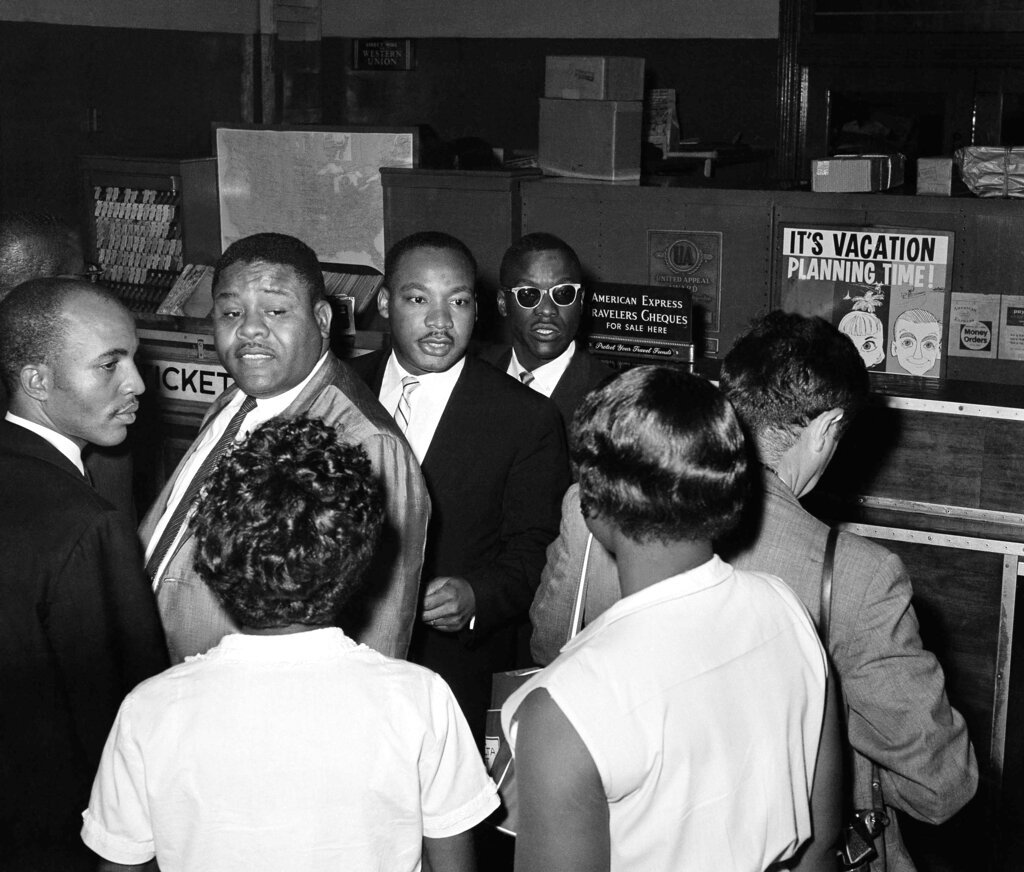The convergence of Bahá’í teachings and the civil rights movement, typified by the endeavors of Martin Luther King Jr. and the Freedom Riders, heralds a profound narrative on unity, justice, and the inexorable quest for truth. Both movements, while distinct in their origins, encapsulate a shared ideology that champions the elevation of human dignity through the prism of compassion and understanding.
At the heart of Bahá’í teachings lies the principle of the oneness of humanity. This tenet resonates powerfully in the context of the civil rights movement, particularly in the actions and philosophies espoused by figures like Martin Luther King Jr. The Freedom Riders, amidst their perilous journeys across a divided nation in the 1960s, epitomized the struggle against racial prejudices—a struggle that aligns seamlessly with the Bahá’í vision of a unified global community. The stark contrast between the ideals of unity and the realities of segregation presents a poignant metaphor: a beautiful tapestry marred by disjointed threads. The Bahá’í faith calls for the weaving together of these threads into a harmonious whole, asserting that the richness of human experience is found in diversity.
King’s philosophy, encapsulated in the doctrine of nonviolent resistance, mirrors the Bahá’í commitment to peaceful means of social change. This philosophy can be likened to a river, coursing through the rugged terrain of human conflict, steadily eroding the rocks of prejudice and intolerance. Just as a river’s water nourishes and sustains life, so too does love and compassion foster growth and understanding among disparate communities. This metaphorical river, drawing from the deep wells of shared humanity, is a clarion call for civil action that adheres to the utmost ethical standards, fostering change without perpetuating a cycle of violence.
The Freedom Riders, imbued with the spirit of sacrifice, embarked on their daunting mission to challenge unjust laws and societal norms. Their journey serves as a poignant allegory for the tenets of the Bahá’í faith, which espouses the importance of service to humanity. Much like the selfless heroism of the Freedom Riders, Bahá’í teachings demand of its adherents a commitment to the betterment of society, urging individuals to transcend their personal tribulations and work towards the welfare of the collective. The trials faced by the Freedom Riders illuminate a fundamental truth: only through collective action and unwavering resolve can systemic injustices be dismantled.
Moreover, the teachings of Bahá’u’lláh emphasize the necessity of justice in all endeavors. Justice, in this context, stands as a formidable pillar upon which peaceful coexistence is architected. King’s calls for justice echoed this sentiment, advocating for an equitable society where all individuals, regardless of their race, background, or beliefs, could thrive unimpeded. This ambition echoes the Bahá’í vision of a just and equitable world—a world where societal structures reflect the moral imperative of treating all individuals with dignity. As such, both the Bahá’í commitment to justice and King’s relentless pursuit of civil rights converge upon the realization that true peace is unattainable in the absence of justice.
In exploring the intersection of these movements, it becomes evident that the notion of “beloved community” is intrinsic to both King’s vision and Bahá’í ideals. The concept, which encourages an inclusive and supportive society, suggests that love and respect for one another can transcend the barriers imposed by prejudice and discrimination. In a world yearning for cohesion, the exhortation to cultivate relationships grounded in mutual respect mirrors the teachings of the Bahá’í faith, which implores its followers to eliminate prejudices of all forms while promoting a spirit of fellowship.
The infusion of Bahá’í principles into the civil rights discourse invites an intriguing juxtaposition of spiritual and social activism. Much like the construct of a garden, where diverse blooms thrive in unity, the harmonization of Bahá’í doctrines with civil rights efforts illustrates a fertile ground for social change. This symbiosis not only enriches the narrative of liberation but also cultivates an enduring legacy that future generations can glean inspiration from. The seeds of action sown by King and the Freedom Riders are reflective of the Bahá’í belief that individuals possess the agency to contribute to the betterment of humanity, a call to action that transcends time and context.
Ultimately, the synthesis of Bahá’í teachings, the valor of Martin Luther King Jr., and the courage exhibited by the Freedom Riders underscores an indomitable truth: the pursuit of justice, peace, and unity is both a profound responsibility and an exhilarating journey. The lessons gleaned from this confluence serve as a guiding light, illuminating the path toward a society where acceptance and love prevail over discord and animosity. With each step taken toward understanding, we weave a richer tapestry—one that resonates with the vibrancy of all its diverse threads, exuding the unique beauty of our shared humanity.
This narrative invites reflection and action, urging us to consider our roles in the tapestry of humanity and the legacy we wish to create. As we honor the sacrifices of those who have fought diligently for civil rights, may we also remember the spiritual principles that guide us towards universal peace and justice, recognizing that each of us contributes to the unfolding story of unity and love, echoing throughout the ages.
